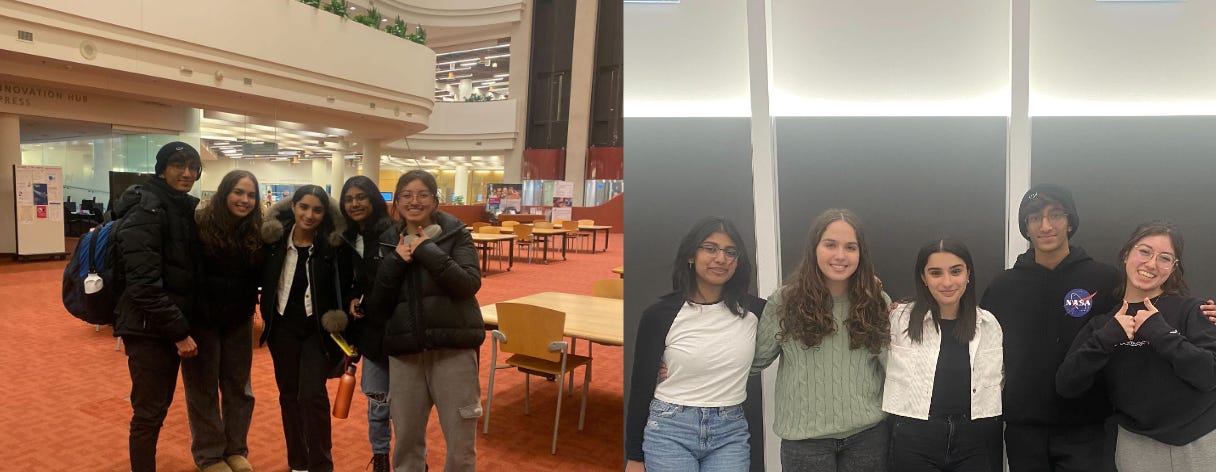Hackathons, Predicting Life Expectancy, Only Getting Older
January Newsletter
Hi everyone! 👋
Welcome to the January edition of my newsletter. I'm a 15-year-old innovator at The Knowledge Society, a global community of the world’s most curious, driven, and ambitious people that want to make an impact.
The primary purpose of this newsletter is to be able to deliver monthly updates that concisely and quickly outline my progress. My monthly newsletters will include everything I do, including projects I work on, lessons I learn, and life experiences.
January is a time of new beginnings.
This month was filled with endless growth and learning. It was the first month of the New Year and I had some big goals.
Introducing HIVax
This month, I had the opportunity to participate in the TKS Focus Hackathon. We had 24 hours to create a deck and pitch to a team of industry experts.
The Problem + Solution:
40 million people. 10 years to live.
HIV is a deadly virus that attacks the very foundation of a person's immune system. The most modern medicine designed to fight HIV, does not cure it, but only controls HIV with the usage of a variety of drugs, leading to various unwanted, painful side effects.
My team and I designed a solution in order to stop the HIV virus from spreading if it ever enters the body.
Introducing HIVax
Our solution was creating an intravenous vaccine to inject in all children to suppress HIV. This way, if they ever develop HIV in the future, they have an in-built mechanism capable of repressing the HIV until it ever proliferates and spreads. If they never develop HIV, then our dormant viral spacer DNA will never activate and thus have no side effects, unlike current solutions.
My amazing team of Krish, Ilana, Stella, Maahi and I made it to the top 6 overall!
Despite having an amazing solution, there was definitely room for improvement. When pitching to the judges, my team prioritized technical depth. This made it difficult for many of the judges and audience members to understand the solution.
🔑 For my next hackathon, I would ensure to have a simple overview of our idea rather than jumping into the complexities of the idea.
Another area for improvement would be leveraging the impact of our problem. HIV affects millions of people worldwide- rather than emphasizing the problem, our pitch did not quantify the problem.
🔑 Next time, I will ensure to add statistics to show the impact of our solution.
How I predicted life expectancy with shocking accuracy!
Regression models are statistical tools that can be used to predict the value of a dependent variable based on one or more independent variables. In the context of predicting life expectancy, regression models can be used to understand the relationship between different factors (such as income, healthcare access, and nutrition) and life expectancy.
The World Health Organization (WHO) published a health data set on life expectancy that included many factors from the four major categories related to health, social, economic, and mortality.
The data set contained information from 193 countries from 2000 to 2015 with 22 columns and 2938 rows. After analyzing the different columns, I was able to see which features correlate with each other.
After creating a correlation matrix, I looked at different scatterplots to see how each feature is correlated to life expectancy.
By analyzing the different scatterplots, I further looked at some of the scatterplots that have strong correlations to life expectancy. These variables are schooling, GDP, income composition of resources and HIV/AIDS death rates.
Turning 15 🎈
On January 1st, not only did I celebrate the beginning of a New Year, but also my birthday!
14 was one of my most transformative year and I had tons of growth.
The best part about having a birthday on January 1st is having a completely blank canvas to start a new journey. Every year, on my birthday I outline exactly who I want to be by the next year and reflect on some of the most transformative moments from the previous year.
Here are some of the key takeaways from my reflection:
Relationships: In the beginning of 2022, I went through big changes with my friends. Being in a different class from almost all my friends distanced us. I continually felt like I was an outsider in my own friendgroup. This was emotionally draining to say the least. Through this, I pushed out of my comfort zone. I had the opportunity to interact with a new group of people and formulate new relationships.
🔑 I realized that when I shifted my outlook on the situation, I formulated some of the most meaningful relationships with so many people; people I never thought I would be friends with.
Personal Development: Throughout most of 2022, I was stuck in this cycle of perfectionism. Every assignment, every conversation, every aspect of my life needed to fit into an unrealistic standard of perfection. I would obsess over the smallest details, only leading me to unhappiness. I did not have time to follow my curiosity and passions.
🔑 In order to be successful, you have to unlearn that drive for perfection. Internalizing that not everything needs to fall under that unrealistic standard of perfection will account for a lot of your success.
My content diet 🎧
My favourite podcasts I came across this month:
What's next? 🎯
Consulting Project 💡
In January, I will be working with a fortune-500 company, training different business and consulting frameworks I have been exploring.
Continuing Velocity 💪
Velocity is an optional program in TKS for innovators to reach their full potential. Stressing on accountability and improving my mindset, I will be using this program to 10x myself.
Competing in DECA Provincials 💯
Ontario DECA is a great organization that provides students with valuable leadership and professional development opportunities. It allows students to gain real-world experience in the field of business. Next month, I am competing provincially in the Entrepreneurship cluster.





